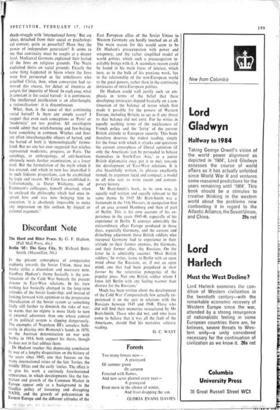Discordant Note
The Hard and Bitter Peace. By G. F. Hudson. (Pall Mall Press, 40s.) Berlin '45: The Grey City. By Richard Brett- Smith. (Macmillan, 30s.)
IN the present atmosphere of comparative euphoria towards the Soviet Union, these two books strike a discordant and necessary note. Geoffrey Hudson's theme basically is the con- tinuation of the Cold War beneath the present détente in East-West relations. In his view nothing has basically changed in the long-term attitudes of the Soviet leadership; and instead of looking forward with optimism to the progressive liberalisation of the Soviet system as something likely still further to diminish the risks of war, he warns that no regime is more likely to turn to external adventure than one whose control of its political system is slipping dangerously. The examples of Napoleon Ill's senseless belli- cosity in playing into Bismarck's hands in 1870, or the Austrian determination on war with Serbia in 1914, both support his thesis, though he does not in fact adduce them.
Dr Hudson reaches this depressing conclusion by way of a lengthy disquisition on the history of the years since 1945, one that focuses on the many international crises of the late 'forties, the middle 'fifties and the early 'sixties. The effect is to give his work a curiously foreshortened appearance, in which developments like the for- mation and growth of the Common Market in Europe appear only as a background to the Gaullist policy of loosening and disrupting NATO, and the growth of polycentrism in Eastern Europe and the different attitudes of the
East European allies of the Soviet Union to Western Germany are hardly touched on at all. The main reason for this would seem to be Dr Hudson's preoccupation with power and weaponry, and the rather simplified model of world politics which such a preoccupation in- evitably brings with it. A secondary reason could be found in his main focus of interest, which here, as in the bulk of his previous work, lies in the relationship of the non-European world to the great powers, rather than in the continuing intricacies of intra-European politics.
Dr Hudson could well justify such an em- phasis in terms of the belief that these developing intricacies depend basically on a con- tinuation of the balance of terror which first made it possible for the powers of Western Europe, including Britain, to act as if any threat to that balance did not exist. For he writes in equally scathing terms of the recklessness of French policy and the `levity' of the current British attitude to European security. This book therefore deserves the widest reading, simply for the force with which it attacks and questions the current atmosphere of liberal optimism (if only the Americans 'can be persuaded to behave themselves in South-East Asia,' as a junior British diplomatist once put it to me), towards the development of East-West relations. It is also beautifully written, its phrases excellently turned, its argument lucid and compact, a model to all who seek to write recent and contem- porary history.
Mr Brett-Smith's book, in its own way, is equally well mitten and equally relevant to the same theme. In 1945 Mr Brett-Smith was a lieutenant in the 11th Hussars, in occupation first of an area around Hamburg and then of part of Berlin. This is his own account of his ex- periences in the years 1945-46, especially of his experience in Berlin. It conveys admirably the extraordinary effect Europe produced in those days, especially Germany, and the curious and disturbing adjustment those British soldiers who occupied Germany had to experience in their attitude to their former enemies, the Germans, and their former allies, the Russians. On the latter he is admirably succinct. 'Most British soldiers,' he writes, 'came to Berlin with an open mind about the Russians, or, if not an open mind, one that had been prejudiced in their favour by the reiterative panegyrics of the popular press. Not one British soldier whom I knew left Berlin with any feeling warmer than distrust for the Russians.'
Much has been written about the development of the Cold War. Comparatively few actually ex- perienced it on the spot in relations with the Russians between 1945 and 1948. Those who did will find their memories resuscitated by Mr Brett-Smith. Those who did not, and who have come to believe that it was all the fault of the Americans, should find his narrative salutary reading.
D. C. WATT





























 Previous page
Previous page